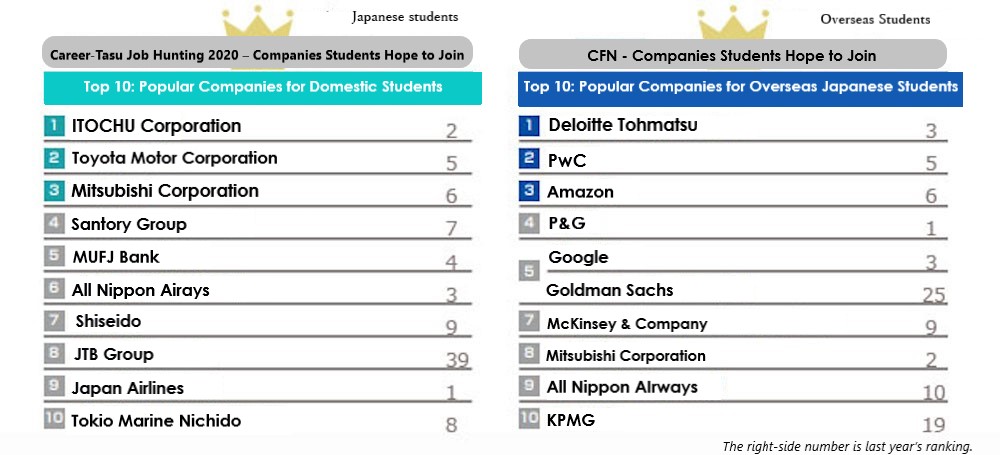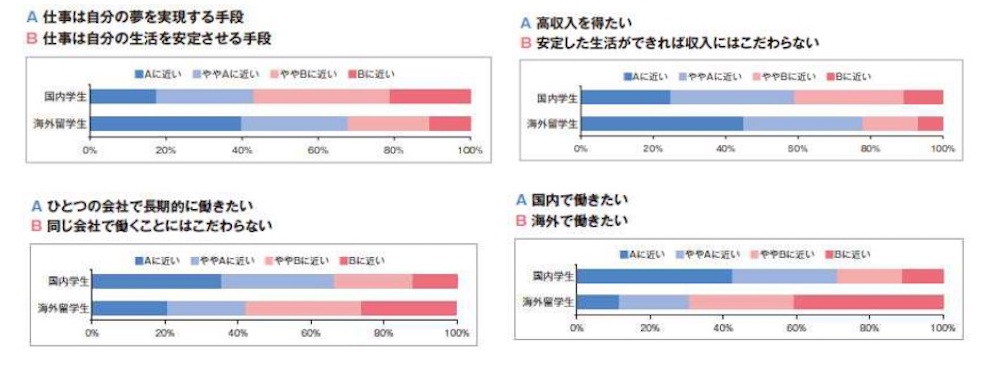DISCO has released the results of its survey regarding companies that students want to work for. The survey was aimed at domestic Japanese students who plan on graduating in 2020, as well as overseas Japanese students who plan on graduating from 2018 to 2020.
The ranking for domestic students was as follows – ITOCHU Corporation in 1st, Toyota Motor Corporation in 2nd, and Mitsubishi Corporation in 3rd. ITOCHU rose to the top spot this year; however, two years ago it was in 7th place, and last year it was in 2nd. Mitsubishi also went up three spots in this year’s ranking. When looked at as a whole, the ranking of banks went down, while sogo shosha (general trading companies) went up. The biggest increase in rank was JTB Group, which was at 39th place last year, but made it to 8th place this year.
As for overseas Japanese students, the ranking was quite different. Deloitte Tohmatsu came in 1st, PwC came in 2nd, and Amazon came in 3rd. There were many consulting companies in the ranking – in addition to Deloitte Tohmatsu and PwC, McKinsey & Company came in 7th place. Global IT companies such as Amazon and Google made the ranking, and companies that were popular for international students getting their full education in North America made them high in the rankings.
Mitsubishi Corporation and All Nippon Airways were the only two Japanese companies to make the top 10. On the other hand, domestic students didn’t even have one foreign company in the top 10 of their ranking. It’s clear that there is a difference in how domestic and overseas students are choosing companies to work for.
 Comparison of the Top 10 of Each Ranking
Comparison of the Top 10 of Each RankingNext, domestic and overseas students were asked about their values and attitudes towards their careers. Regarding their values, around 60% of domestic students responded that “my job is a way to give me a stable life.” However, nearly 70% of overseas students responded that their job was “a way to realize my dreams.” Overseas students also responded that they wanted “a high salary.” On the other hand, more than a few domestic students responded that “as long as it provides a stable life, my salary doesn’t matter.” It’s clear that domestic students tend to value stability.
Regarding their career preferences, nearly 70% of domestic students responded that they “want to work at one company for a long time.” Around 60% of overseas students, on the other hand, responded that “it doesn’t matter if I stay at the same company.” This shows a clear difference in attitudes about changing jobs. Also, less than 30% of domestic students responded that they “want to work overseas,” whereas nearly 70% of overseas students responded that they wanted to do so.
 Values and attitudes towards careers
Values and attitudes towards careersWhen you compare these results, domestic students seem to want to work at a company for a long time in order to provide themselves a stable life, whereas overseas students seem to want to take advantage of their study abroad experience, and work in an environment that is active globally. These differences in career values and aims have a major influence in the way these groups choose workplaces.
The survey for domestic students was aimed at members of the job hunting information site “Career-Tasu Job Hunting 2020.” Those participants were surveyed from November 2018 to March 2019. Overseas students, on the other hand, were surveyed on the job hunting information site CFN, and their survey was conducted in September and October 2018.
[Reference] Career-Tasu Job Hunting 2020 – Ranking of Companies Students Hope to Join
[Reference] CFN – Ranking of Companies Overseas Students Hope to Join



















